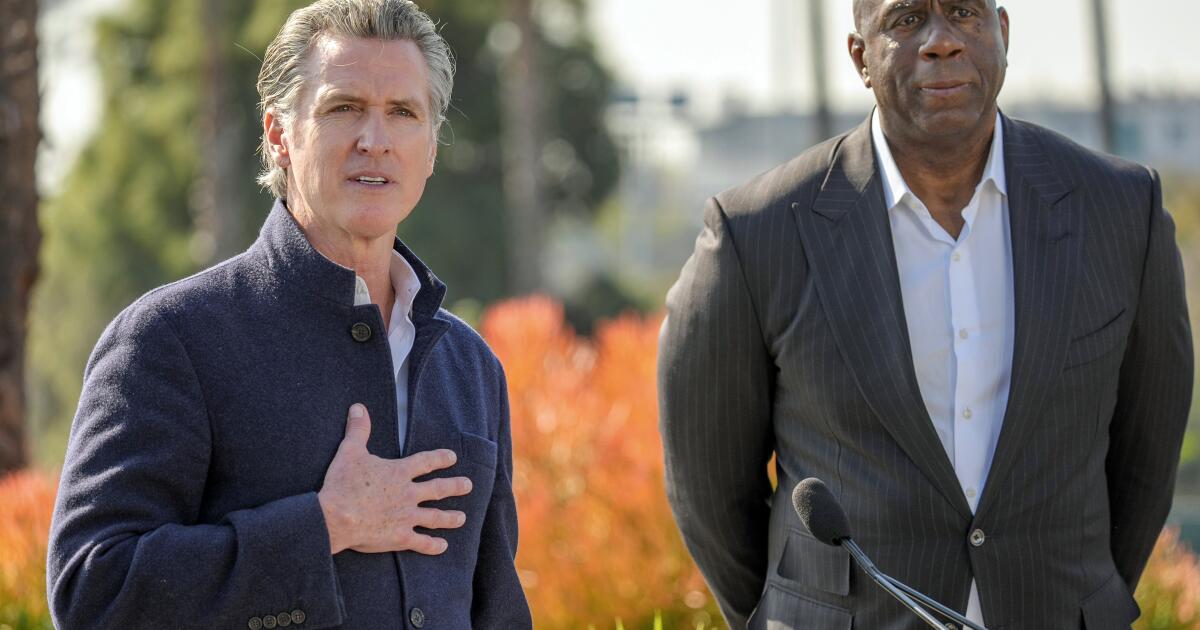Dodgers pledged $100 million to wildfire relief fund. So far? $7.8 million
Not long after Pacific Palisades and Altadena had burned, Gov. Gavin Newsom summoned reporters and television cameras to Dodger Stadium. Newsom stepped behind a podium dropped within a stadium parking lot, with a commanding view of Los Angeles as the backdrop.
He was there to unveil LA Rises, a signature initiative under which the private sector and philanthropists could unite to help Southern California rebuild and recover.
The most valuable player that day: Mark Walter, the Dodgers’ chairman and controlling owner. The big announcement: Walter and two of his associated charities — his family foundation and the Dodgers’ foundation — would contribute up to $100 million as “an initial commitment” to LA Rises.
“We should clap for that,” Dodgers co-owner Magic Johnson told the assembled media. “A hundred million dollars, that’s an outstanding thing.”
One year later, Newsom’s initiative has struggled to distinguish itself amid a panoply of wildfire relief efforts. LA Rises has delivered $20 million to date, including $7.8 million from Walter’s family foundation, according to Newsom’s office.
“If it’s a number of 20 million after one year, after such a severe occurrence, and with Los Angeles having the giving capacity to meet that goal, I would have expected to hear that there had been more commitments, at a minimum,” said Casey Rogers, founder of Santa Barbara-based Telea Insights, which advises philanthropists and leaders of nonprofit organizations.
“Maybe not all of those commitments would have been paid. Maybe they would have been commitments over a number of years. But it would have been closer to the goal.”
Walter stands by his pledge, Dodgers president Stan Kasten said. A representative of Newsom’s office said Walter’s pledge did not come with a timeline.
“I know we haven’t spent the full 100 yet,” Kasten said, “but this is a long-term commitment.”
Rather than solicit large donations up front and determine how to use the money later, LA Rises prefers to identify “impactful opportunities for investment” as they arise and then “coordinate financial support from a variety of private, public and philanthropic donors, including the Walter Family Foundation,” said Dee Dee Myers, director of Newsom’s office of business and economic development.
Of the Walter foundation contributions, $5 million went toward grants for impacted small business, workers and nonprofits, with $2.8 million to Pasadena City College for modernizing and expanding technical education programs to train workers that can help rebuild their own communities.
LA Rises also funded programs that include day camps and mental health intervention to children affected by the fires; streamlined architectural planning and permits for survivors wishing to rebuild; and support for Habitat for Humanity in building new homes and rebuilding damaged ones.
“The administration is incredibly grateful for any philanthropic dollars that have gone towards the rebuilding efforts in Los Angeles,” Myers said.
The competition for those dollars is fierce. The Milken Institute reported that private giving toward wildfire relief — from individuals, corporations and other entities — hit nearly $1 billion last year.
“I know there has been a lot of money that has been paid to various programs,” Kasten said, “and there has also been some rethinking about how LA Rises is deployed and what foundational money from the Dodgers is used for. We continue to work hard with a lot of groups on that tragedy.
“There are talks ongoing about a variety of programs and a variety of ways of funding things. We are still very involved with this, both with LA Rises and other entities.”
Kasten did not rule out Walter shifting some or all of his remaining funding commitment to an organization outside LA Rises.
“I don’t know exactly what entity we will be formally engaged with — or doing it separately — but we’re absolutely committed to helping out those programs that need that kind of help,” he said. “We’ve done a lot of it already, and we can do a lot more.”
